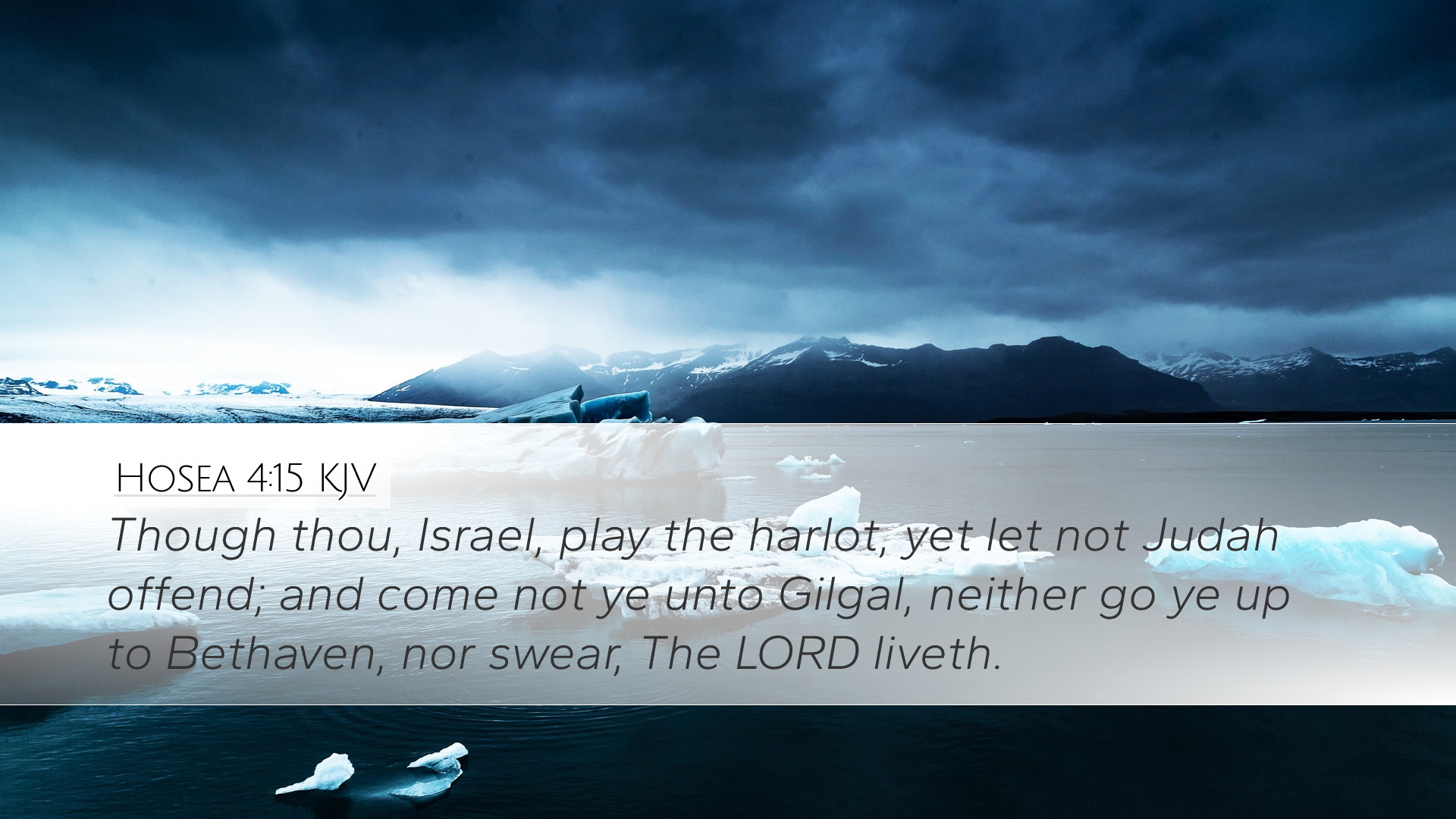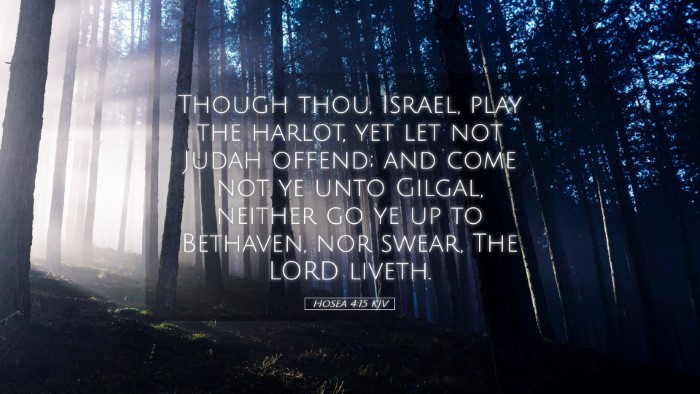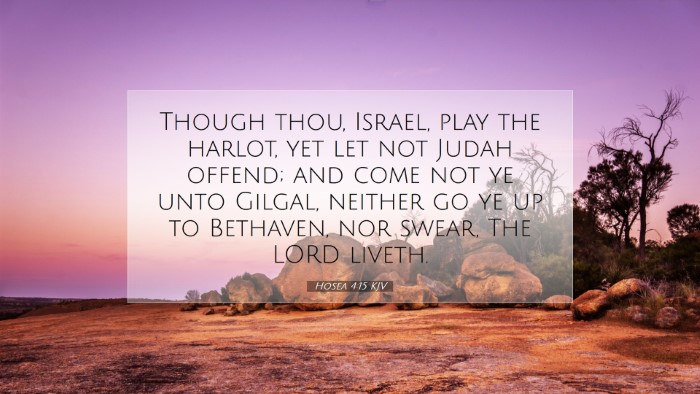Old Testament
Genesis Exodus Leviticus Numbers Deuteronomy Joshua Judges Ruth 1 Samuel 2 Samuel 1 Kings 2 Kings 1 Chronicles 2 Chronicles Ezra Nehemiah Esther Job Psalms Proverbs Ecclesiastes Song of Solomon Isaiah Jeremiah Lamentations Ezekiel Daniel Hosea Joel Amos Obadiah Jonah Micah Nahum Habakkuk Zephaniah Haggai Zechariah MalachiHosea 4:15
Hosea 4:15 KJV
Though thou, Israel, play the harlot, yet let not Judah offend; and come not ye unto Gilgal, neither go ye up to Bethaven, nor swear, The LORD liveth.
Hosea 4:15 Bible Commentary
Bible Commentary on Hosea 4:15
Verse Text: "Though thou, Israel, play the harlot, yet let not Judah offend; and come not ye unto Gilgal, neither go ye up to Beth-aven, nor swear, The Lord liveth." (Hosea 4:15, KJV)
Introduction
The Book of Hosea offers profound insights into the nature of God, His covenant love, and the collective infidelity of Israel. In Hosea 4:15, we find a critical verse addressing both the sins of Israel and a warning to Judah. This commentary synthesizes insights from public domain commentaries to provide a deeper understanding of this passage.
Contextual Background
Hosea prophesied during a tumultuous time in Israel's history, marked by idolatry, moral decay, and impending judgment. His marriage to Gomer serves as a poignant metaphor for Israel's unfaithfulness to God. The distinction made in 4:15 between Israel and Judah indicates the reality of sin that permeates both kingdoms while implying a call for Judah to remain steadfast.
Insights from Commentators
Matthew Henry
Henry emphasizes the metaphor of "playing the harlot," illustrating the spiritual infidelity of Israel. He notes that the Israelites had departed from God, engaging in idolatry and immorality. Yet, he calls attention to Judah, urging that they should not be entangled in Israel’s sin. He warns that the sins of others should not encourage us to sin but rather serve as a reluctance to follow their path. Furthermore, he highlights the reference to Gilgal and Beth-aven, places associated with idol worship and the fallacy of false worship.
Albert Barnes
Barnes reflects on the notion of "playing the harlot" and points out that Israel’s spiritual adultery had catastrophic implications. He comments on the historical significance of Gilgal and Beth-aven, stressing that these locations had lost their original purpose of true worship of Jehovah and had become centers for sinful practices. Barnes posits that God’s desire is for His people to distance themselves from such places and practices. He emphasizes that Judah must learn from Israel's example, cautioning against the allure of idolatry and the danger of becoming complacent with sin.
Adam Clarke
Clarke delves into the dual nature of the verse. On one hand, it laments Israel's failings, while on the other, it provides a stark warning to Judah. Clarke suggests that the exhortation not to go to Gilgal or Beth-aven serves as a divine command to avoid areas of sin and corruption. He elaborates on how these locations became synonymous with corruption, reiterating how important it is for the faithful to avoid both physical and spiritual places that lead away from God’s commandments. Clarke also highlights the significance of swearing allegiance to God, expressing that true faith must be accompanied by actions aligning with God's will.
Theological Implications
Hosea 4:15 contains several theological implications significant for understanding the character of God and His expectations for His people:
- God's Holiness: This verse underscores God's holiness and the divine standards He sets for His covenant people. The call to avoid idolatry reflects God’s serious stance against sin.
- Covenantal Faithfulness: The mention of Judah signifies a remnant that is called to remain faithful. This points towards the importance of covenant loyalty amidst a fallen world.
- Warnings Against Idolatry: The references to Gilgal and Beth-aven symbolize the perils of spiritual compromise. They serve as a reminder of the destructive nature of idolatry, which leads people away from true worship.
Practical Applications
For pastors, students, and theologians, Hosea 4:15 challenges us to reflect on both personal and communal fidelity to God:
- Examine Our Hearts: Individuals must critically assess where they might be "playing the harlot" in their own lives—what idols may have crept in that distract from full allegiance to God.
- Cultivate Accountability: Just as Judah is warned to stay away from Israel’s sins, the church is called to maintain a community that holds one another accountable against the encroachments of sin.
- Return to True Worship: The call to avoid specific places entails a broader message of returning to genuine worship and forsaking any form of idolatry that may exist in contemporary practices.
Conclusion
Hosea 4:15 serves as a poignant reminder of the call to faithfulness and the dangers of spiritual infidelity. Through the insights gleaned from Matthew Henry, Albert Barnes, and Adam Clarke, we are reminded that while Israel's sin invites judgment, there is also hope for a faithful remnant to stand firm in their commitments to God. This verse offers profound implications not only for the understanding of God's relationship with His people but also for practical living in faith. As we reflect on this passage, let us strive to uphold fidelity to God, shunning spiritual complacency, and continually seeking true worship.


